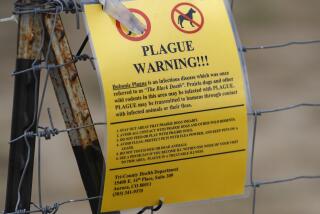AIDS: a General Plague
- Share via
AIDS is not a homosexual plague. It is a national plague. The number of cases continues to grow at an alarming rate, and it has now spread to heterosexuals, threatening the country with an epidemic unequaled in modern times.
Make no mistake about it: The 9,600 cases reported since the sexually transmitted disease was discovered in 1981 are just the tip of the iceberg. The number of people infected with AIDS is expected to mushroom in coming years to the tens of thousands. A million Americans may already have been exposed to the virus that causes AIDS. Most of them don’t know it, and they continue their sexual practices, spreading the disease still further. The incubation period can be as long as five years before symptoms develop. How many more people will be exposed in that time?
At the present state of knowledge, AIDS is fatal. Half of those who have come down with it are already dead. The rest have not died yet. No one has recovered from AIDS. Medical researchers, who have learned much about AIDS in four years, continue to work toward finding a cure. But they are not optimistic of a breakthrough anytime soon. It is going to get worse before it gets better.
So why is public concern so muted? Why has AIDS not sent a shiver down the national spine the way, say, Legionnaire’s disease or swine flu did a few years back? The threat posed by those health problems was minuscule compared to AIDS, but the reactions then were much more severe than the reactions now. To be sure, Margaret M. Heckler, the secretary of health and human services, has declared AIDS the nation’s No. 1 health problem, and the federal government is spending $96 million this year on AIDS research. But the message doesn’t seem to have sunk into the public at large.
It’s hard to avoid the conclusion that most people consider AIDS a problem for gays, and some people undoubtedly think that homosexuals are getting what they deserve. If AIDS had struck the general population from the outset, public reaction and government reaction at all levels would have been different.
For the moment, public education seems to be the most effective way of cutting down the spread of AIDS. People need to know that heterosexuals are at risk, and they should take precautions to limit their exposure.
Governments at all levels should do more and spend more to promote research on AIDS and to assist people with the disease. A cure needs to be found. A vaccine needs to be found. Wiping out AIDS must be at the top of the nation’s agenda in deed as well as in words.
More to Read
Sign up for Essential California
The most important California stories and recommendations in your inbox every morning.
You may occasionally receive promotional content from the Los Angeles Times.













